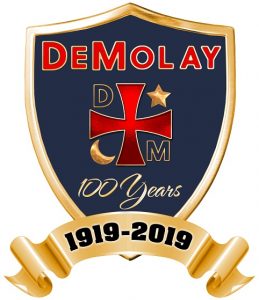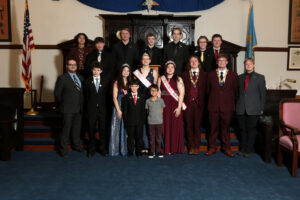
DeMolay is an organization dedicated to preparing young men to lead successful, happy, and productive lives. Basing its approach on timeless principles and practical, hands-on experience, DeMolay opens doors for young men aged 12 to 21 by developing the civic awareness, personal responsibility, and leadership skills so vitally needed in society today. DeMolay combines this serious mission with a fun approach that builds important bonds of friendship among members in more than 1,000 chapters worldwide. DeMolay has a Squire Program which begins at the age of 9 to 11 and so those younger kids can begin their journey in this wonderful organization.
DeMolay alumni include Walt Disney, John Wayne, Walter Cronkite, football Hall-of-Famer Fran Tarkington, legendary Nebraska football coach Tom Osborne, news anchor David Goodnow, and many others. Each has spoken eloquently of the life-changing benefit gained from their involvement in DeMolay.
The Anoka Chapter of DeMolay has a rich history being Originally Chartered in Early 1935 and resurrected again in 1965 but sadly went into decline again and folded but was once more brought into existence in 2014.
We are a busy chapter with a wide array of events and the ability to add events as the young men choose. We are growing and we’d love you to join us either by Joining DeMolay or attending an event as our guest. See the link below for Anoka DeMolay events.
To get more information about DeMolay follow the links to:
The Story of Jacques DeMolay
The namesake of the Order of DeMolay was born in Vitrey, Department of Haute Saone, France in the year 1244. At the age of 21, DeMolay joined the Order of Knights Templar.
The Knights Templar was an organization sanctioned by the Roman Catholic Church in 1128 to guard the road between Jerusalem and Acre, an important port city on the Mediterranean Sea. The Order of Knights Templar participated in the Crusades and earned a name for valor and heroism.
With many nobles and princes sending their sons to join the Knights Templar, the Order also became very wealthy and popular throughout Europe.
In 1298, Jacques DeMolay was named Grand Master of the Knights Templar, a position of power and prestige. As Grand Master however, Jacques DeMolay was also in a difficult position. The Crusades were not achieving their goals. The non-Christian Saracens defeated the Crusaders in battle and captured many vital cities and posts. The Knights Templar and the Hospitalers (another Order of Knights) were the only groups remaining to confront the Saracens.
The Knights Templar decided to reorganize and regain their strength. They traveled to the island of Cyprus, waiting for the general public to rise up in support of another Crusade.
Instead of public support, however, the Knights attracted the attention of powerful lords, who were interested in obtaining their wealth and power. In 1305, Philip the Fair, King of France, set about to obtain control of the Knights Templars. They had been accountable only to the Church. To prevent a rise in the power of the Church, and to increase his own wealth, Philip set out to take over the Knights.
The year 1307 saw the beginning of the persecution of the Knights. Jacques DeMolay, along with hundreds of others, were seized and thrown into dungeons. For seven years, DeMolay and the Knights suffered torture and inhuman conditions. While the Knights did not end, Philip managed to force Pope Clement to condemn the Templars. Their wealth and property were confiscated and given to Philip’s supporters.
During years of torture, Jacques DeMolay continued to be loyal to his friends and Knights. He refused to disclose the location of the funds of the Order and he refused to betray his comrades. On March 18, 1314, DeMolay was tried by a special court. As evidence, the court depended on a forged confession, allegedly signed by DeMolay.
Jacques DeMolay disavowed the forged confession. Under the laws of the time, the disavowal of a confession was punishable by death. Another Knight, Guy of Auvergne, likewise disavowed his confession and stood with Jacques DeMolay.
King Philip ordered them both to be burned at the stake that day, and thus the story of Jacques DeMolay became a testimonial to loyalty and friendship.

